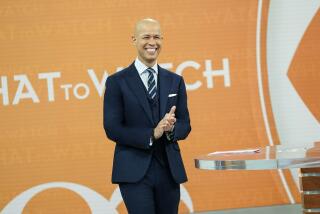TV AND THE GULF WAR : CBS Wins Race to Kuwait City
It was a scene straight out of a Hollywood movie--liberated wartime civilians welcoming a conquering hero.
But the only weapon this man of the hour carried was a microphone. He was a CBS reporter, Bob McKeown, who, with his crew of three, slipped into Kuwait city Tuesday and sent back to American TV viewers remarkable, live footage of street scenes with joyous residents and resistance fighters.
What he conquered was military censors--the footage wasn’t cleared by anybody in government. In fact, CBS News Vice President Joe Peyronnin said, “We received calls from Pentagon officials and the White House that they were riveted to our coverage. We got congratulations from the Pentagon.”
The startling and dramatic footage, seen from early morning to midday in Los Angeles, also took the measure of the network competition, which had nothing to match it, and was an important morale- and prestige-builder for CBS, whose Gulf War coverage has often drawn criticism and low ratings.
McKeown, a former Canadian TV reporter, pro football player and newspaper columnist who joined CBS last August, has broken into the open--away from censors and pool reporting--twice since the ground war began last weekend. On Saturday, he came up with a vivid audio report about artillery bombardment near the Iraq-Kuwait border.
At times Tuesday, McKeown got carried away with his scoop and overstated and oversimplified the situation in Kuwait city. At one moment, despite his limited vantage point, he said, “There is no question that as we stand here, Kuwait city is a free city.”
He seemed on relatively safe ground. But the judicious hand of CBS anchor Dan Rather, who questioned McKeown from Dhahran, Saudi Arabia, gave the scoop more credence as he toned it down a bit.
Fighting was, in fact, still going on in and around Kuwait city. And instead of going whole hog, Rather noted subtly that the city was “being liberated.” At another point, he commented to McKeown, “You said it was a free city in some ways.”
In a phone interview with The Times from Dhahran, moments after he signed off CBS at 1 p.m., Rather said he was trying to keep McKeown’s exclusive report in perspective.
“We know enough about how large cities are liberated to know that even when the early elements get inside and you can say the liberating forces are here, that sometimes it takes a very long time--it certainly takes some hours--to secure it.
“What I attempted to do was to kind of put a frame around what was happening for the viewer and listener so they would understand that,” Rather said. “And in subsequent hours, this has been the case--the Marines are still fighting on the outskirts of the city. They still are having some difficulties securing the airport.”
In New York, Peyronnin said McKeown was “broadcasting live and reporting the information he had from people. We wanted to make sure Dan’s qualifier was on the statement.”
One of McKeown’s most dramatic moments came at 12:52 p.m., when he interviewed two Marines who he said were working with the Kuwaiti resistance movement. They said on camera that the U.S. Embassy was now “unofficially open” and in the hands of American forces.
“I think I can state for a fact,” said Rather in the phone interview about 15 minutes later, “that that’s the first time that information’s been out.”
Rather said that he believed that one of the crew members accompanying McKeown “went out and got those Marines and brought them back to the transmission point.”
The CBS anchor said the network dispatched several mobile broadcast units “with instructions to push north, keep pushing, see how far you can get.”
A member of McKeown’s crew, Andy Thompson, filed an audio report from Kuwait city about 6:30 a.m.
“We were then advised by shortwave that they were setting up their dish to transmit the live video footage,” said Peyronnin, whose wife, Susan Zirinsky--the model for the Holly Hunter character in “Broadcast News”--is running CBS coverage in Dhahran.
When McKeown’s image popped up on a monitor in a CBS control room in New York, a cheer went up. At about 7 a.m. in Los Angeles, the first live video report from Kuwait city began to air.
And viewers got some sights to behold. As McKeown and his crew drove into the city, even the routine highway shots were a fresh TV burst of uncensored material, even though it looked little different than riding down the San Bernardino Freeway.
In the city, McKeown was exuberant: “People in their back yards are waving at us--the victory sign. . . . I’ve been kissed by more Kuwaiti men than I can count.” But then, later, the CBS reporter noted soberly that it is “a less jubilant place. It may be a free city, but it’s still a city at war.”
Kuwaitis who spoke English gathered excitedly around McKeown. One man carrying an M-16 claimed he and others had taken prisoner hundreds of Iraqis. A woman said of Iraqi President Saddam Hussein: “Just like Hitler--you can say that.”
While CBS reveled in the McKeown coup, Rather said in the phone interview that the network still hadn’t had any luck in trying to free another of its teams, including correspondent Bob Simon, that disappeared when it also tried to do some non-pool reporting.
“We have every reason to believe that they’re still in Baghdad and that they’re all right,” said Rather. “The Russian embassy in Baghdad was contacted today. They said they had raised it with the Iraqis but had no new information. We’re still hoping and praying that they’ll be out soon.”
More to Read
The complete guide to home viewing
Get Screen Gab for everything about the TV shows and streaming movies everyone’s talking about.
You may occasionally receive promotional content from the Los Angeles Times.






